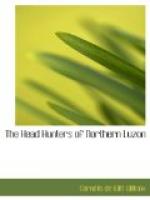If told, then, by his political leaders that he must ask for independence, the Filipino most certainly will ask for it; and the fact that in the majority of cases he has no idea of what he is asking for will make no difference to him, just as this makes no difference to his cacique, or boss. But it ought to make a great deal of difference to us. We may be giving him edged tools to play with, only to find when too late that the edge has been turned against him, a result for which we should then be directly responsible. If a general or universal request could be taken to show that lack of independence is operating to deprive the Filipino of his liberty and to estop him in the pursuit of happiness, the situation of affairs would be confessedly acute. But it is a fact patent to all who know the country, that the Filipino enjoys a freedom at least as great as that of the average American citizen, and is at complete liberty to pursue happiness in any way consistent with the law of the land and with the rights of others. We must conclude that a request, even if universal, would not necessarily be for us a safe guide of action. The universality shown might prove merely that all had agreed to what had been proposed by the leaders, and would leave untouched the merits of the case.
V.
Intimately allied with this question of reasonableness are those of readiness, preparedness, capacity to assume the burdens as well as the rights and privileges of independence.
On readiness, we need not dwell; it is the readiness of acquiescence, not of preparation: the Filipinos are ready, just as children are ready to play with matches. But preparedness and capacity call for more consideration, however brief.
No one will pretend that the Filipinos have had any political training. Before the arrival of the Spaniards, only 350 years ago, they were all uncivilized. Many of them are still semi-savages; others are savages pure and simple. These facts are indisputable. If, then, we turn to history for assistance, we can not find a single instance of any real political evolution in any of the various divisions of the inhabitants of the Archipelago. The exception furnished by the debased Mohammedan sultanates of the great Island of Mindanao is only apparent. The germ of fruitful growth is everywhere missing. Now, the Spaniards assuredly took no steps to teach their new subjects the art and science of government; there was every reason, from their point of view, why they should not teach this art and science. On the other hand, our own course has been totally different. We have lost no time in putting political power into the hands of the natives, so that to-day, after fourteen years’ possession, municipal and provincial government are almost wholly native. To crown all, we have given the Filipinos an elective legislature, an Assembly, all the members of which are native.




